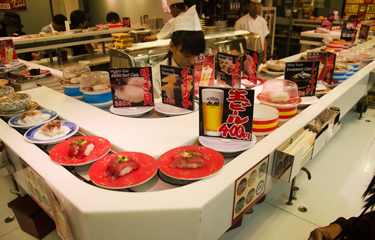Japanese sushi chain investigated for obtaining rival chain’s internal sales data

One of the biggest sushi chains in Japan is being investigated for stealing proprietary information from a rival.
Police searched the Yokohama, Japan-headquarters of Kappa Create Co., Ltd., which operates the Kappa Sushi conveyor-belt sushi chain on 28 June. On 5 July, the company issued a press release acknowledging that a complaint from a competitor, Hama-sushi Co., Ltd., had been filed against one of its officers.
Hama-sushi (pronounced “Hamazushi” in Japanese), a subsidiary of Tokyo-based Zensho Holdings Co., Ltd., had filed the complaint under the Unfair Competition Prevention Law, alleging that its confidential internal sales data was sent to Koki Tanabe, the president of Kappa Create, on several occasions.
Tanabe served as a director at Hama-sushi between 2014 and 2017, and is suspected of obtaining the data from a former colleague there. The information was allegedly obtained from when he joined Kappa Create as an advisor in November or December 2020. He became vice president of the company in December 2020 and was promoted to president in February 2021.
In its statement, Kappa Sushi said it would cooperate fully with the investigation and strictly punish those involved, pending the results of the investigation.
The rotary sushi business operates on thin margins in Japan as diners are attracted by plates of two nigiri-zushi for just JPY 100 (USD 0.91, EUR 0.77), plus tax. Competition is fierce as a result.
By both sales and number of outlets, the top five chains in the sector are Akindo Sushiro, Kura Corporation, Hama-sushi, Kappa Sushi, and Genki Zushi.
Hama-sushi’s parent, Zensho Holdings, also operates the popular Sukiya beef bowl chain as well as several other lesser-known brands, in addition to the Japanese franchises of several U.S. chains: Coco’s, El Torito, and Big Boy. Hama-sushi has adopted a strategy of diversifying its menu, including many beef and duck sushi toppings. However, the chain has lost market share in recent years, and has reduced its restaurant count from 505 in the year 2017 to about 450 shops currently.
Kappa Sushi was the largest conveyor-belt sushi company until 2010, but lost sales because it did not increase non-sushi side dishes as quickly as other conveyor-belt sushi companies. However, it began to offer special campaigns such as all-you-can-eat sushi and half-priced beer. It now has approximately 325 stores, down from 345 stores in 2017.
Sushiro is the goliath of the industry, with revenues half again as big as Hama-sushi’s and growing, while its rivals fight for the remaining market share or look to overseas markets for expansion.
Photo courtesy of Anirut Thailand/Shutterstock






Share